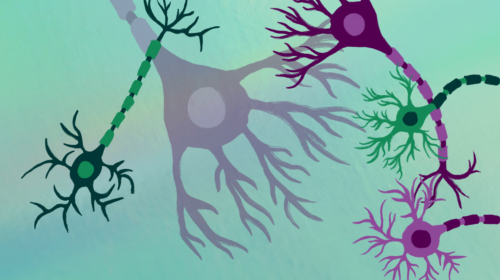Art by Madeleine Popofsky
Memories make us who we are. Yet, memory loss is a strikingly common phenomenon in our society, often manifesting in people with neurological conditions such as Alzheimer’s or Parkinson’s disease. In particular, Alzheimer’s disease (AD) patients often have difficulty storing memories long term and associating memories. While hydrogen sulfide has been previously considered as a possible anti-inflammatory therapeutic for AD, its effect on memory remained unclear. In a study published in the Journal of Alzheimer’s Disease, Anoop Manakkadan and Dolly Krishnan worked with Sreedharan Sajikumar, associate professor of physiology at the National University of Singapore, to elucidate the effect of hydrogen sulfide on synaptic plasticity: the ability of neurons to modify the strength of their connections.
The researchers investigated this problem using a technique called in vitro electrophysiology, which records the electrical activity of tissues. Slices of the hippocampus, a key part of the brain involved in memory formation, were taken from rats and electrically stimulated. Their goal was to induce long-term potentiation (LTP), a cellular phenomenon that strengthens connections between neurons when they are repeatedly activated together, aligning with the principle that “neurons that fire together, wire together.”
Depending on the type of stimulation, LTP can be classified into different forms. Early-LTP is induced by weak stimulation, lasts only a few hours, and is associated with short-term memory. In contrast, late-LTP is induced by repeated strong stimulation, lasts for many hours or even days, and is associated with long-term memory. In their study, the scientists simulated AD conditions in the rat hippocampal slices and observed LTP impairment. Saliently, when they added in a molecule that donates hydrogen sulfide, LTP function was saved.
The researchers also wanted to test whether these neuronal connections responsible for memory can form associations with each other. To do so, they relied on the framework of a fascinating hypothesis: memory is largely associative and involuntary. Our neural system conserves energy by associating a strong memory with a weak memory, transforming the latter into long-term memory. “You might not remember what you had for lunch last week, but if that lunch was part of a special event—like your birthday—you’re more likely to recall it,” Sajikumar said. The synaptic tagging and capture (STC) hypothesis explains this process for converting short-term memories to long-term memories at the cellular level. According to the hypothesis, short-term memories leave a “tag” at the synapses between neurons, making them temporarily receptive to memory-related proteins. If, within a certain period, a more impactful experience (like a birthday celebration) occurs, these tagged synapses can “capture” memory proteins from the long-term memory system. By doing so, they strengthen the weaker memory and make it last longer. Even if what you had for lunch that day was seemingly irrelevant, because it is linked to the salient memory of a birthday surprise, the initial weak memory becomes reinforced as a long-term memory. AD patients are hypothesized to have STC disruptions that prevent them from associating and storing memories over time.
To test the STC hypothesis, early-LTP and late-LTP were electrically induced in the rat hippocampal tissues. Late-LTP was induced in one neuronal pathway, followed by early-LTP in a nearby pathway thirty minutes later. While STC was disrupted in the AD-simulated condition, early-LTP—due to its temporal proximity to a strongly stimulated pathway undergoing late-LTP—was strengthened when hydrogen sulfide was added. In other words, short-term memory was strengthened when it was near neurons capturing long-term memories.
These findings highlight the importance of further study into the role of hydrogen sulfide in rescuing memory function by strengthening long-term memory storage and neural associations—two processes that, when disrupted, are hallmarks of AD. No side effects of hydrogen sulfide were observed in the preliminary study. In the future, Sajikumar aims to conduct behavioral studies in AD mice models, optimizing dosage and method of administration of hydrogen sulfide. While the road to curing AD may be long, hydrogen sulfide could be a promising step in the journey.

